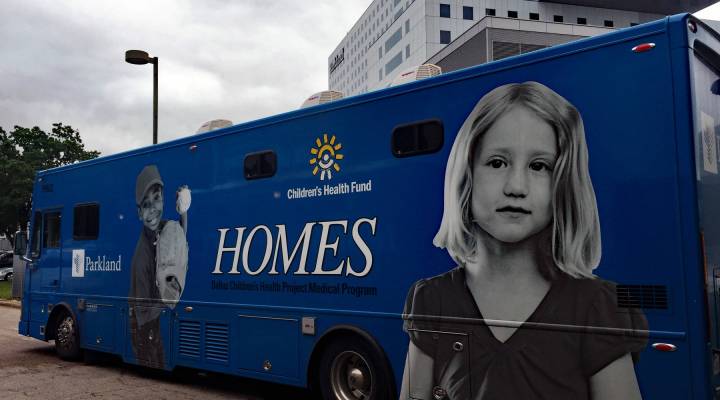
Hospitals use mobile clinics to increase access

There’s been a lot of talk about the mobile health revolution; making it possible to see your doctor from your living room or couch.
But this is mobile health that doesn’t fit in a phone. In fact, it’s 40 feet long and looks like a mix between an RV, a school bus and a doctor’s office. It’s a mobile health clinic.
People hop on, check in, and get labs drawn just like a normal clinic. Patient Hannah Salam is in the middle of an appointment, getting weighed and then slipping her tattooed arm into the blood pressure cuff.
“When I first came in, I was kind of surprised it was really set up like a medical facility,” she said. Salam got out of prison a few months ago and is staying at a halfway house before she’s off parole.
Patient Hannah Salam gets checked on the mobile health van by Cori Dickie, RN.
She’s on this van to get the results of a lab test she took a week ago on another of Parkland’s mobile vans. This kind of follow up sounds mundane, but it’s fundamental to treating people on the move. Follow up is tricky for patients without cars, who are often switching shelters or apartments.
r. Susan Spalding, medical director of the Parkland Homeless Outreach Medical Services Program, says these folks face the same health problems as everyone else — high blood pressure, diabetes and asthma. But they often end up in the emergency room instead of a doctor’s office. The hospital wants to change that.
The mobile vans make it as easy as possible to get help, and they’ve been popular. Last year, 9000 homeless Dallas residents got on board for free care. More than 1500 of them were kids.
“Many people throughout the country use mobile clinics twice a week,” Spalding said. “We run Monday through Friday, eight in the morning to sometimes eight at night. There are a lot of people in and out.”
Across the country, the mobile health clinic is having a bit of a renaissance.
Dr. Susan Spalding is medical director of the Parkland HOMES Program.
“There are lot of mobile clinics right now, many more than people might imagine,” said Caterina Hill, research associate at Harvard Medical School and co-investigator at Mobile Health Map.
She said there are more than 2000 mobile clinics in the U.S. Some hospitals are investing in these clinics on wheels because they’re shifting their focus from the ER to managing chronic illness and preventative care. Rigging up the vans with all the standard medical equipment isn’t cheap, but Hill’s research shows it saves money.
“We’ve estimated that an average visit to a mobile clinic costs the funder $155, but saves 12 times that in terms of long-term benefits and avoided emergency department visits,” she said.
So, if mobile clinics are so great, why aren’t more health systems using them? Hill said part of the reason is their image.
“People have perceived it, because it’s in the community as being lower quality. So that’s why we’re trying to build the evidence base around it so people are aware of it as a tool to help health care systems improve the health of those who need it most,” she said.
The mobile clinic program in Dallas is experimenting with rounding out those services, adding social workers, dentists and psychologists.
Note: The audio version of this story has been updated to remove an interviewee’s personal details.
There’s a lot happening in the world. Through it all, Marketplace is here for you.
You rely on Marketplace to break down the world’s events and tell you how it affects you in a fact-based, approachable way. We rely on your financial support to keep making that possible.
Your donation today powers the independent journalism that you rely on. For just $5/month, you can help sustain Marketplace so we can keep reporting on the things that matter to you.


















